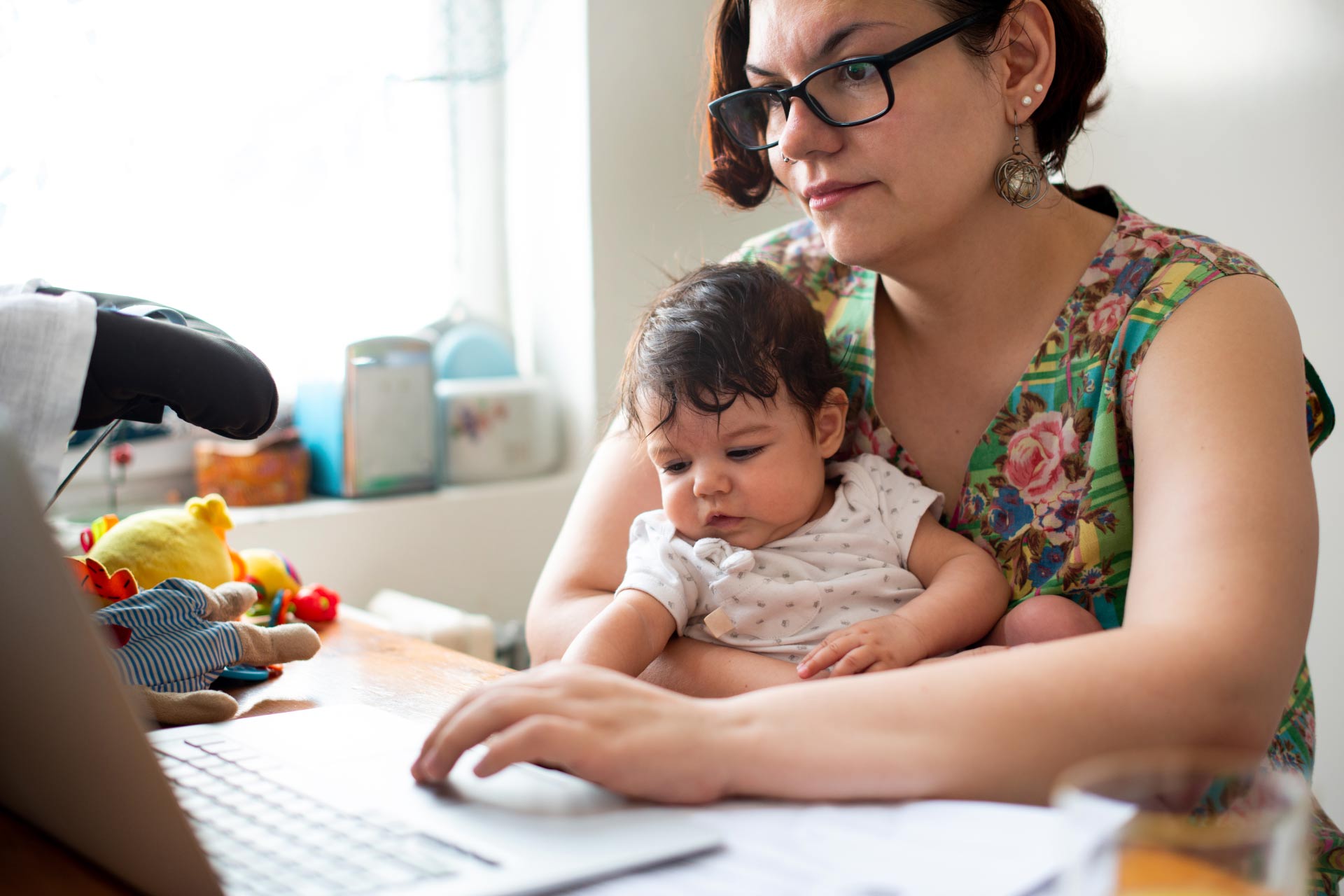
Dr Rachel Ashman, Dr Laura Radcliffe and Professor Caroline Gatrell delve into the experiences of working mothers during COVID19 and reflect on how national lockdowns caused a reversal to traditional gender roles.
As a result of the UK government’s attempt to limit the spread of COVID19 through national lockdowns, employed mothers were required to provide home-schooling and care for children, often whilst performing paid work.
This initiative overlooked well-established labour market and caring inequalities already faced by women, and led to employed mothers being disproportionately impacted by the pandemic.
In the paper “Reordering Motherhood and Employment: Mobilising ‘Mums Everywhere’ during Covid-19”, co-authored with Professor Anthony Patterson, we explore the impact of this sudden transition to home-working enforced by the government.
The study draws on actor-network theory, a theoretical concept whereby human and non-human actors (eg technology) are given equal status and described as existing in fluid ‘networks’.
Through an in-depth qualitative study, focused on employed mothers’ experiences of being ‘mobilised’ as part of this government initiative, we observe how they re-ordered their local networks and support systems to combine homeworking, home-schooling and childcare.
This research illuminates how mothers experienced and responded to the breakdown of networks which previously supported their working lives, such as schools and nurseries, during a non-voluntary transfer to homeworking.
How did working mothers cope during COVID19?
The findings highlight three different ways mothers altered their networks and, importantly, demonstrates how the prejudices mothers may face influence this process.
Often the first attempt to re-order and adapt to the withdrawal of important actors was retentive, and revolved around employed mothers continuing to present themselves as an ‘ideal worker’ able to remain as committed to their work, as before the sudden and sharp rise in family responsibilities.
This included trying to ensure children did not visibly interrupt the working day through locking doors, and via the introduction of formal timetables and written schedules, to share responsibilities with partners.
These attempts to adhere to traditional notions of professionalism were often unreliable, with evidence of heterosexual couples falling back into ‘traditional’ patterns, where women managed the childcare and men focused on employment.
For some women this led to retrogressive reordering, which involved stepping back from, or quitting their jobs, to focus on caregiving, despite the detrimental impact this may have on their careers.
Influential in this reordering process was the idea of maternal guilt, a long-established ‘actor’ in women’s decisions surrounding work and family.
One research participant said:
I..have the most guilt about not giving my eldest daughter much home schooling. I’ve… accepted that I can’t do well at my job at the moment …I’ve reduced my hours
The challenges for mothers were particularly evident in examples where other actors in their local networks failed to be mobilised.
However, within this struggle, in some cases was the peace that came with the simplification of daytime activities, and no longer having to manage multiple responsibilities, which made up pre-pandemic networks and required a great deal of energy to maintain (eg transportation, childcare).
The introduction of some flexibility in daytime schedules allowed some mothers to attempt reformative reordering, experimenting with new schedules, allowing for greater fluidity and merging of childcare and work.
Reformative reordering demonstrated the importance of employers acting as allies in this process, allowing for more flexible schedules and offering support to employed mothers as they learned to adapt.
This mode of reordering was also often fragile, with the introduction of a deadline or an unsupportive colleague at work threatening this flexibility.
Such ongoing network breakdowns and attempts to reorder, evidently caused mothers to feel overwhelmed, with another research participant saying:
I’m exhausted, and I feel anxious…my mind’s a mash
The COVID19 response, a risk to gender equality
For many, the paper highlights how the forced home-schooling and homeworking initiative often mobilised employed mothers to revert to traditional gender roles.
Considering this, we argue the COVID19 response constituted a risk to equality agendas, and suggest women should not be treated as a reserve army when governments seek to mobilise employees in national causes.
Our findings also demonstrate how mothers routinely rely on a complex network of actors to support their employment, which can be an enduring struggle to maintain.
Other circumstances such as a family bereavement or the breakdown of a marriage are examples where employed mothers may need to routinely re-order their employment networks, which are fluctuating and vulnerable to shifting circumstances.
Maternal employment is therefore fragile in the current social and employment context, and requires greater support than presently provided.
While wider societal shifts are required in relation to gender, parenthood, and employment, there are important steps that organisations can begin to take.
For instance, leaders/managers can work within their organisations to revise current norms on professionalism, which prescribe narrowly defined ways of working and rigid work-nonwork divides.
Explicit encouragement of more varied, shifting, and flexible ways of working, including vocally supporting greater fluidity between home and work as a viable approach, can move us to more inclusive cultures, better able to support employees through shifting life circumstances.
Impact |
|---|
|
This research has been awarded £14,356 from the ESRC IAA Health and Wellbeing Impact Accelerator Fund. As part of this project we are working alongside colleagues at Lancaster University with three organisational partners - Avenir, Head Office and How Do You Do It -, to embed the findings of our research into wider organisational practice. Together, we are co-creating a toolkit titled 'A Managers Guide to Supporting an Inclusive, Family-Friendly, Hybrid Workplace', which will be launched to the wider public in summer 2023. |
|
|
Reader in Marketing |
|
|
Reader in Organisational Behaviour |
|
|
Professor of Organisation Studies |


